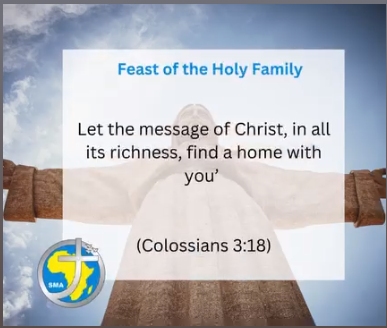Theme: ‘Let the message of Christ, in all its richness, find a home with you’ (Colossians 3:18)
Readings: Genesis:15:1-6 and 21:1-3; Colossians 3:12-21; Luke 2:22-40
On this Feast of the Holy Family we are invited to reflect on the importance of family in our lives and on the values which underpin and sustain it. Created in the image of a God who is a Community-in-Love (three in one), the meaning of our lives is to be found in relationship. Our identity as human beings is inseparable from that network of relationships we call ‘family’ – not just the family into which we are born, but the wider family of friends and relations, of county and country, of Church, of all humanity and, indeed, of all God’s creatures, great and small, with whom we are inextricably connected. And our final destiny is to belong to the family of the blessed in heaven. We might say that family is inscribed in our DNA. It is part of who and what we are. All this is all beautifully captured in the Africa philosophy of Ubuntu, which means ‘I am because we are’.
Our readings today are all about family. The first reading from the book of Genesis tells us the story of the patriarch, Abraham and his wife Sarah, who were already old before God blessed them with children. Abraham’s anguish at his childless condition is reflected in his complaint to the Lord: ‘See, you have given me no descendants; some man of my household will be my heir’ (Gen 15:3). But the Lord assures him that he will have heirs from his own flesh and blood – heirs as numerous as the stars of heaven. Despite the seeming improbability of this promise, given that Sarah was well past child-bearing age, we are told that Abraham put his faith in the Lord, and he and his wife were blessed with a son, Isaac. This reading reminds us that children are gifts of God. While they enter the world through their parents, they do not belong to them. In the concise words of the Lebanese poet, Khalil Gibran, speaking to parents:
‘They come through you but not from you,
And, though they are with you,
Yet they belong not to you.’
The gospel reading – Luke’s account of the presentation of the baby Jesus in the Temple – also highlights the truth that children do not belong to their parents. While in the temple, the holy family meet two elderly Israelites, Simeon and Anna. Representatives of the faithful remnant of Israel (the anawim), who hoped and longed for the liberation of Israel, they recognise the baby Jesus as the promised Messiah. The joy of Simeon, is captured in his beautiful prayer: ‘Now, Master, you can let your servant go in peace, just as you promised; because my eyes have seen the salvation which you have prepared for all the nations to see, a light to enlighten the pagans, and the glory of your people, Israel’ (Lk 2:29). Luke tells us that Mary and Joseph are wrapped in wonder at the gracious words of Simeon. However, they are brought down to earth with a bang by Simeon’s next words to Mary: ‘You see this child: he is destined for the fall and the rising of many in Israel, destined to be a sign that is rejected – an a sword will pierce your own soul, too’ (Lk 2: 34-35).
It is impossible to hear these words today without thinking of the many mothers (and fathers), in Gaza, Israel, Ukraine, Sudan, Nigeria, and many other countries, whose hearts are pierced with unspeakable pain at what is happening to their children in our troubled and violent world. There is no easy answer to their pain, except to remember that it was this deeply wounded world that Christ was born into, and came to save. And to remember, too, that life for the holy family was not all sunshine and roses. They were not spared the anguish and pain that many families are experiencing today. They had to undertake a perilous journey when Mary was heavily pregnant and she had to bring her precious baby to birth in an animal shelter. They had to endure the terror of an imminent threat to the life of their special child, and flee into exile until the threat was ended. They were no strangers to hurt and puzzlement as their teenage Son asserted his independence, and to the pain of his rejection by the very people he came to save.
Christmas is a time for us to re-connect and bond with family and friends – those with whom we feel most at home. Many of you will recall, perhaps with a sense of nostalgia, ‘the good old days’ when homes were places where families and friends met and talked, laughed and sang, and celebrated life together. Today, we live in a world of mass communication with the latest state of the art iphones and ipads, but perhaps we communicate less with those who matter most in our lives. Christmas is a time when we should make a special effort to reach out to those whose love creates a home for us in ‘this crazy world’ (Christy Dignam). It is a time to let go of grudges and build bridges, a time, as St Paul reminds us in our second Reading, ‘to let the message of Christ, in all its richness, find a home’ in us, a time to be kind, compassionate and gentle; a time to forgive and to let the peace of Christ reign in our hearts, not just now but at all times.
Michael McCabe SMA
To listen to an alternative Homily for this Sunday, from Fr Tom Casey of the SMA Media Centre, Ndola, Zambia please click on the play button below.
|
|

